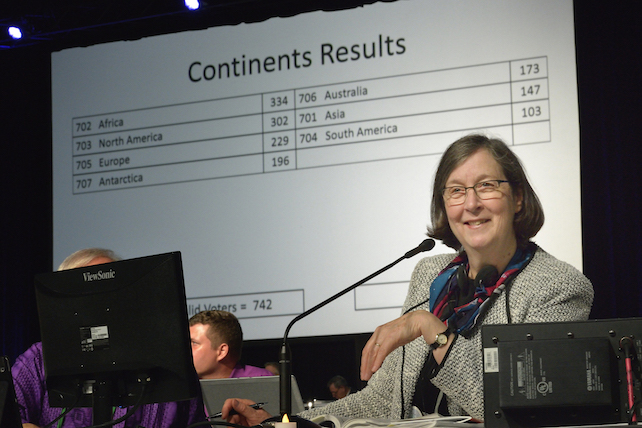Even planning the one-day virtual meeting comes with limitations, as Simpson told church leaders in earlier meetings.
The coming General Conference has 862 voting delegates — 55.9% come from the U.S., 32% from Africa, 6% from the Philippines, 4.6% from Europe and the remainder from concordat churches that have close ties to The United Methodist Church.
At a typical General Conference, bishops from around the globe as well as interpreters and other staff are needed for the proceedings.
That kind of meeting is not possible this year. But in the meantime, denominational ministries have been struggling to find workarounds to function in a situation never anticipated by the Book of Discipline — whose contents General Conference determines.
“When we became aware of the need for a further postponement, we knew that some action needed to be taken in order to free the church to operate and continue to fulfill its current mission until we could gather in person,” said Harvey, who leads the Louisiana Conference as well as the Council of Bishops.
After the COVID-19 pandemic forced the assembly’s postponement from May 2020, the commission rescheduled General Conference for Aug. 29-Sept. 7 this year and kept it in Minneapolis.
The commission maintained the late-summer dates even after young-adult delegates and other United Methodists urged a change because the new schedule conflicted with the start of the academic calendar. However, the commission also committed to look at ways for delegates to vote remotely.
As the pandemic continued to claim lives around the globe and travel restrictions persisted, calls increased for the General Conference commission to consider virtual options for the assembly.
On Feb. 20, the commission met online in closed session to review and make decisions based on its study team’s report. Joining commission members and staff for the meeting was Leonard Young, who served as parliamentarian for the special 2019 General Conference.
The Discipline says that “in the spirit of openness and accountability,” almost all church meetings should be open.
In Paragraph 722, the Discipline does allow closed sessions for “negotiations, when general knowledge could be harmful to the negotiation process” and “negotiations involving confidential third-party information.” The commission cited the negotiation exceptions when it went into closed session.

